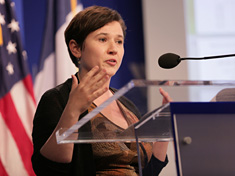-
Family Planning, Reproductive Health Crucial to Zika Response, Says Chloë Cooney
April 22, 2016 By Sean Peoples “Zika has made a long-standing public health crisis impossible to ignore,” says Chloë Cooney, director of global advocacy at the Planned Parenthood Federation of America, in this week’s podcast.
“Zika has made a long-standing public health crisis impossible to ignore,” says Chloë Cooney, director of global advocacy at the Planned Parenthood Federation of America, in this week’s podcast.“Zika has made a long-standing public health crisis impossible to ignore,” says Chloë Cooney, director of global advocacy at the Planned Parenthood Federation of America, in this week’s podcast.
Latin America is home to some of the most restrictive abortion laws; nearly 95 percent of the procedures are unsafe, Cooney says. Additionally, “there’s an estimated 23 million women who have an unmet need for contraception.” Zika, primarily spread through the bite of an infected mosquito, “demonstrates the critical need of government support for sexual and reproductive health care.” These issues are not new, she says, “but Zika makes the impact of them so much greater.”
The outbreak of the virus in Latin America and the Caribbean in 2015 has put women in the spotlight, as some governments urge them to avoid pregnancy. National level maternal and reproductive health indicators in the region are not as bad some places in the world, but mask deep inequalities. “Women with the least ability to plan their families, with the least access to health care,” Cooney says, “generally will feel the impact of this outbreak the most.”
Addressing the needs of vulnerable populations, especially women, is fresh on the minds of those in the global health community tasked with achieving the newly minted Sustainable Development Goals (SDGs). “The SDGs call on us to address inequities in development both across countries but also within countries,” says Cooney. “And I think that’s so critical to Zika as we’ve been talking about where poor women face such a deep unmet need for sexual and reproductive health and rights.”
The virus continues to spread, and a study recently confirmed its link to microcephaly and other severe birth defects. The way countries in Latin America and North America respond in the coming months will be crucial. Family planning, Cooney says, should be a critical element.
“The U.S. response must include family planning and reproductive health,” Cooney argues, “along with maternal and child health support and attention to supporting families with children with microcephaly.”
The ability to decide if and when to have children is a basic human right, she says – “and yet it’s not realized for so many women across the region, which this outbreak is making so crystal clear.”
Chloë Cooney spoke at the Wilson Center on April 12, 2016.
Friday Podcasts are also available for download on iTunes and Google Podcasts.
 A Publication of the Stimson Center.
A Publication of the Stimson Center.

 “Zika has made a long-standing public health crisis impossible to ignore,” says Chloë Cooney, director of global advocacy at the Planned Parenthood Federation of America, in this week’s podcast.
“Zika has made a long-standing public health crisis impossible to ignore,” says Chloë Cooney, director of global advocacy at the Planned Parenthood Federation of America, in this week’s podcast.

